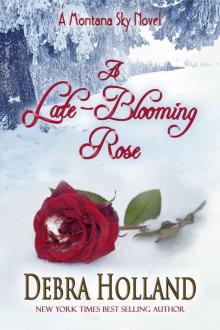- Home
- Debra Holland
A Late-Blooming Rose: A Montana Sky Series Novel
A Late-Blooming Rose: A Montana Sky Series Novel Read online
A LATE-BLOOMING ROSE
A MONTANA SKY NOVELLA
by Debra Holland
Copyright © 2019 by Debra Holland
Digital Edition
ISBN-13: 978-1-939813-68-8
All other rights reserved by the author. The reproduction or other use of any part of this publication without the prior written consent of the rights holder is an infringement of the copyright law.
TABLE OF CONTENTS
A LATE-BLOOMING ROSE
Chapter 1
Chapter 2
Chapter 3
Chapter 4
Chapter 5
Chapter 6
Chapter 7
Chapter 8
Chapter 9
Chapter 10
Chapter 11
Chapter 12
Chapter 13
Chapter 14
Chapter 15
Chapter 16
Chapter 17
Dear Reader
Excerpt from BEYOND MONTANA’S SKY
The Montana Sky Series
About the Author
Dear Reader,
The events in A Late-Blooming Rose are best understood if you’ve first read Glorious Montana Sky and Montana Sky Justice
CHAPTER ONE
New York
1896
Rose Collier sensed a presence in front of her desk, situated near the ionic column entrance of Stone Street Library, where she was entering the latest donations of books into a ledger—or at least trying to. The dire situation with her brother Marty’s illness interfered with her concentration and made her penmanship shaky.
She looked to see twelve-year-old Jimmy Ortner aiming his crooked grin at her. She laid down her pen and gave him a warm smile. “Hello, Jimmy.”
His freckled face beaming with pride, the boy held up The Three Musketeers. “I’ve finished, Miss Collier.”
“Excellent!” she praised. “Tell me what you thought.”
His blue eyes lit with boyish zeal. “I liked the sword fighting the best.”
“Of course,” Rose said with a smile, listening to him describe his favorite scenes, sometimes asking questions to draw him out more. Mentoring the children—especially the smart ones like Jimmy—and encouraging their love of reading was the most gratifying part of her job. They were so interesting and easy to talk to.
A wave of sadness came over her. I’ll miss the children when I leave, Jimmy in particular.
Rose didn’t let her feelings show on her face but kept her expression interested. “Which one was your favorite musketeer?”
“D’Artagnan.” Jimmy dramatically thrust back his shoulders and fisted his hand to his chest. “‘My heart is that of a musketeer,’” he intoned in a deep voice, portraying the character as well as a scrawny twelve-year-old could.
“So true,” she murmured, forcing the words through the sudden lump in her throat.
Jimmy possessed an intellect far beyond his years and a powerful imagination, which Rose encouraged. The son of a widowed baker, the child was slight, with weak lungs, and would probably never be strong enough to fight with fists or swords—or stick versions thereof. Last year, noting his dexterity with numbers, she’d coaxed the boy to try adventure stories, which awakened a desire to read. Since then, Jimmy steadily worked his way through her list of suggested titles.
I won’t have a chance to watch Jimmy grow, see what he does with his education and love of reading.
The boy lowered his arm and became himself again. “What should I read next, Miss Collier?”
Rose tapped one finger on the desk, and then swayed by the enthusiasm in his voice, decided. “I believe you are now ready to try Moby Dick; or, the Whale.” She slanted him a mock stern glance. “I must warn you. This isn’t a book that’s easy to read, even for adults. However, if you stick with it, I think you’ll find the story quite exciting, indeed.” Pain stabbed her heart at the thought of not being at the library when he finished. I won’t hear what he thought about Captain Ahab or his nemesis, the white whale.
Rose couldn’t say anything to Jimmy about her retirement. She hadn’t yet given her resignation to Harvard Nicklesby-Ward, the director of Stone Street Library, and she didn’t want him to hear rumors before their talk.
Instead, she stood and motioned for the boy to follow her under the large arched doorways and into an immense high-ceiling room, with ornate ceiling cornices and rows of tall shelves. Light came from long clerestory windows. As Rose moved through the stacks, her skirt rustling, she breathed in the familiar dusty smell of books. From years of practice, she kept her footsteps light, so as not to disturb the patrons.
Jimmy clomped along behind her, his hard-soled shoes on the wooden floor making enough sound to carry throughout the library.
The spine of one book jutted out, and Rose slowed to push the volume back in place, lining up the leather edge with the others on the shelves before continuing down the aisle.
“The library has two copies of Moby Dick, so I’m sure one will be available,” she said in a quiet voice. As they turned the corner, the portrait of the library’s benefactor Andrew Carnegie gazed down benevolently.
She led Jimmy down several aisles and made a right, stopping unerringly in front of the shelf containing the writings of Herman Melville. “Ah, just as I thought. Two are available.” She pulled out a blue volume and extended the book to him but didn’t release it.
“Now you must promise to be careful with this one. Moby Dick is out of print, so if you damage this copy—” she raised her eyebrows, reminding him of the time his dog Max chewed on the cover of Tom Sawyer “—we cannot easily replace the book.” She let go.
Jimmy clutched the heavy volume to his chest, his eyes wide and solemn. “Don’t worry. I make certain, now, to keep every book out of Max’s reach. Besides, Ma said she’d skin me alive if she had to pay for the damages to another one.”
Rose raised her eyebrows. “I’m surprised she didn’t threaten to skin Max.”
“Nah. She likes Max better than me.” He grinned.
This time Rose couldn’t resist, chuckling and reaching out to ruffle Jimmy’s hair. She knew how much widowed Mrs. Ortner adored her only child and worried for his welfare. The woman once confided to Rose her difficulty in refraining from constantly hovering like an umbrella over the boy.
“Max is adorable.” She briefly tapped the tip of his nose. “But, as you very well know, you’re foremost in your mother’s affections.”
She tilted her head in the direction of the counter near the door, where Miss Hall, the assistant librarian who’d worked here almost as long as Rose, was on check-in and check-out duty. “Go on with you, now, Jimmy. The sooner you arrive home, the sooner you can start reading about the great white whale.”
“Yes, Miss Collier.” He lifted the book with both hands. “When I’m finished, I’ll tell you all about the story.”
“I’ll look forward to hearing your opinion.”
Firming her lips against saying more, Rose kept the smile on her face until he walked away. When she resigned from the library, she intended to leave her address so her favorite patrons could correspond with her. But she knew reading their accounts wouldn’t be as good as having a discussion.
Her heart heavy, Rose took a seat at her desk and, once again, glanced at the book on top of the stack, searching for the title. She had to blink away sudden tears to see clearly, and then picked up her pen and wrote the title in her ledger, her copperplate handwriting only a little shaky.
* * *
As the sunlight outside the library windows dimmed, Miss Hall turned on the gaslight, signaling
to Rose that the time had come to give her two-week notice. Her chest tight, she pressed her lips together, closed her ledger, and stood, gathering her composure. She stepped out from behind her desk and forced herself to head toward the staircase in the back of the library.
The director’s office was situated on the second floor. For once she didn’t have to navigate the stairs with books or ledgers and papers in hand while at the same time keeping her skirt high enough so she wouldn’t trip on the hem.
Well-trodden red carpet covered the marble staircase, which Rose must have climbed thousands of times during her twenty-two-year tenure as librarian. I won’t be making many more visits to Mr. Nicklesby-Ward’s office.
So deeply in thought was she that finding herself in front of his paneled door surprised her. Pulling out of her reverie, Rose straightened her shoulders and knocked.
“Come in.”
The decorative brass plate around the crystal knob needed polishing. Rose made a mental note to mention the task to the cleaner. She opened the door and went into the office, a large-dark-paneled room filled with bookshelves overflowing with volumes, both his own and the library’s.
As usual, books and papers covered the director’s large desk. He looked up, gave her his prissy smile, and set the pen he was using into the holder of the inkwell.
Tall and reedy, with thinning dark hair and silky side-whiskers, Harvard Nicklesby-Ward, a member of the cadet branch of the Nicklesby family and thus forced to work for a living, had a snobbish, finicky manner. He was inclined to cater to their higher-class patrons and ignore the needs of the poorer people. Not that anyone who patronized the library was of the upper class. The rich could afford to buy whatever books they wanted.
Aside from those sometimes-annoying traits, Mr. Nicklesby-Ward was an agreeable man, who, like her, lived and breathed books. They’d had many fine discussions—debates, even—on various topics.
In the past few years since Marty’s illness gradually weakened him, the director had sometimes called upon her brother and entertained him with similar erudite conversations. From time to time, Mrs. Nicklesby-Ward invited Rose to a dinner party, one of the few social invitations she felt comfortable accepting.
I’ll always be grateful for the director’s kindness.
Rose shut the door behind her and moved to one of the wooden chairs situated in front of the desk. She took a seat, her back straight, and clasped her hands together to keep her fingers from fiddling and showing her nerves. “You know about my brother’s condition. His illness has worsened, and he’s….” The lump was back, clogging her throat and blocking the word dying. Tears misted her vision.
Mr. Nicklesby-Ward remained silent, fiddling with his letter opener while waiting for her to recover. His warm brown eyes—his best feature—showed compassion. “He’s no better, then, Miss Collier?”
Rose shook her head and struggled to regain her composure. Lifting her chin, she forced out the sentence that would sever her from the employment she held most dear. But not as dear as Marty. “I must tender my resignation.” In a few months, I won’t have either my job or my brother.
His expression pulling downward, the director leaned back, his leather chair creaking. “I’m not surprised, given your brother’s deteriorating condition when last I saw him.”
She could only nod.
He sighed. “It’s hard to see you go. You’ve served this library faithfully for twenty-two years. Longer than I have, even.”
Rose forced lightness into her tone. “I’d be more concerned about leaving if I didn’t know your nephew has graduated from college and returned from his trip to Europe. Thus, Reginald can take my place.”
The director gave her a brief smile and, as if to gather his thoughts, reached to shuffle the papers on his desk into a stack. He moved them until the bottom edge aligned perfectly with the desktop, a great expanse of red cedar. “I can’t deny stepping into a position here would be a godsend for my nephew. I’ll certainly enjoy having Reginald around. But…” He swallowed audibly. “You will be missed, dear Miss Collier, by our patrons and staff. I will miss you.”
Coming from a man usually inarticulate about expressing his emotions, the simple statement meant a great deal. With sudden moisture once again misting her eyes, Rose could only nod. Finally, she tilted up her chin to keep the tears from spilling over and fisted her hands in her lap until her nails dug into her skin.
Obviously uncomfortable with her emotion, he couldn’t meet her eyes. “Normally, of course, I’d ask for several weeks’ notice. But due to the circumstances, you must leave whenever you think best. I will promote Miss Hall to fill your position, and Reginald will become the assistant librarian. He’s already applied himself to learning the Dewey decimal system in preparation for working at a library, although we had not thought Stone Street would be the one.”
With a deep breath to regain her composure, she placed a hand on the edge of the desk, “Do you think Reginald could come tomorrow so I could help train him? I’d planned on giving you two weeks notice, but if that’s not necessary, I think a day, or at the most, two, would suffice for him to learn what he needs to know.”
Moving to logistics apparently put Mr. Nicklesby-Ward on more comfortable ground for he nodded and smiled. “I’ll make sure my nephew will be here.”
“Do you suppose Reginald could also help me transport my belongings home? Over the past weeks, I should have gradually removed my books and cleared out my desk, but that seemed….”
His smile held compassion. “In your place, I, too, would have held out hope for as long as possible.”
The comment made Rose realize with a chill that, yes, indeed, she’d lost hope for her brother’s recovery. All she had left was duty…and love.
And when Marty is gone?
Not wanting to think of the loneliness to come, she shrugged off the insidious question. For truthfully in some ways she’d been lonely for twenty-two years, ever since…. An image arose in her mind of an auburn-haired, hazel-eyed bibliophile. From long practice, she forcefully banished the reminder of Andre Bellaire and turned her thoughts back to her brother.
I’ll have time enough to learn the answer of my life without Marty.
CHAPTER TWO
Sweetwater Springs,
Montana
Andre Bellaire puttered around the glass conservatory attached to the back of his new house—mansion, really—dead-heading the roses. A phonograph played a disc recording, and the muted strains of Handel filled the air. He smiled at the sunny yellow center of the bright pink Apothecary’s rose and bent to inhale the fragrance, closing his eyes to better savor the sweet scent.
Opening his eyes and straightening, Andre looked around the room, a large half-circle filled with plants—mostly roses. Pots held other flowers, some hothouse blooms and others native to the area. Pipes running underneath the tiled floor kept the room warm in the colder months—and Montana had plenty of those.
His daughter Delia, a native of New Orleans, struggled with the long winters. But she’d planted her roots deeply into the soil of this land out of love for her new husband, as well as Joshua’s ten-year-old son, Micah.
As for Andre, after twenty years in New York, he’d thought he was used to cold temperatures. But the East Coast winters weren’t Montana winters. At least he didn’t have to cope with the dingy gray sky of a New York winter. Here, on a clear, cold day, the stark sky arched overhead, blue and beautiful. Those last few years in New York, he’d struggled with low spirits during the cold months.
Ah, well, there is still time before winter hits. Best enjoy the August sunshine while the season lasts.
Looking through the glass wall of the conservatory, Andre enjoyed the extensive view of his garden, flowing into the acreage he’d donated to the town of Sweetwater Springs for use as a park. He picked up opera glasses resting on a round wicker table and raised them to his eyes. Through the lenses, he could see several men from the work crew digging a massive hol
e near the bandstand constructed for the Harvest Festival.
Close by, a tree lay on its side, the roots bagged in burlap.
Elton Reid, the horticultural designer imported from New York, supervised the planting, his hands moving to direct the men or hold the trunk.
With satisfaction, Andre set down the opera glasses and turned back to his work, snipping off the remains of a Queen Maud peach rose and dropping the withered blossom into a wicker basket near his feet.
He moved to the next bush, the Empress Red, imported from New York at great expense, and frowned. The gardener assured him the flowers were velvety red. Yet, in the year and a half he and his daughter’s family had lived in their new home, the rosebush failed to bloom. Not for the first time, Andre glowered at the recalcitrant bush, wondering what he should do.
He heard rapid approaching footsteps and turned.
Micah, still in his school clothes, burst through the door, waving an envelope. He trotted over to Andre and rocked back on his heels. “I looked in your bedroom, Grand-père, but you weren’t there. After school, I picked up the mail from the train station. A letter’s come from your friend, Marty. I recognize the handwriting.”
“Give that to me, you rascal.” Andre swiped the letter from his grandson and tapped him on the forehead with the envelope, his fond smile softening the comment.
Micah frowned pointedly at the scissors in Andre’s hand. “Maman’s going to be angry. You’re supposed to be resting.”
Who’s the adult here, and who’s the child? “Working with my roses is very restful.”

 A Late-Blooming Rose: A Montana Sky Series Novel
A Late-Blooming Rose: A Montana Sky Series Novel Mystic Montana Sky (The Montana Sky Series Book 6)
Mystic Montana Sky (The Montana Sky Series Book 6) Harvest of Dreams (The Gods' Dream Trilogy)
Harvest of Dreams (The Gods' Dream Trilogy) Healing Montana Sky
Healing Montana Sky Beneath Montana's Sky: A Montana Sky Novella (The Montana Sky Series Book 0)
Beneath Montana's Sky: A Montana Sky Novella (The Montana Sky Series Book 0) Wild Montana Sky (The Montana Sky Series)
Wild Montana Sky (The Montana Sky Series) Mail-Order Brides of the West: Trudy (A Montana Sky Series Novel)
Mail-Order Brides of the West: Trudy (A Montana Sky Series Novel) Sower of Dreams (The Gods' Dream Trilogy)
Sower of Dreams (The Gods' Dream Trilogy) An Irish Blessing: The Irish Sisters Trilogy (Montana Sky Series)
An Irish Blessing: The Irish Sisters Trilogy (Montana Sky Series) Grace: Bride of Montana (American Mail-Order Bride 41)
Grace: Bride of Montana (American Mail-Order Bride 41) Glorious Montana Sky (The Montana Sky Series)
Glorious Montana Sky (The Montana Sky Series) Montana Sky Christmas: A Sweetwater Springs Short Story Collection
Montana Sky Christmas: A Sweetwater Springs Short Story Collection Sweetwater Springs Scrooge: A Montana Sky Holiday Short Story (The Montana Sky Series)
Sweetwater Springs Scrooge: A Montana Sky Holiday Short Story (The Montana Sky Series) MONTANA SKY 07.5: Angel In Paradise
MONTANA SKY 07.5: Angel In Paradise Singing Montana Sky (The Montana Sky Series Book 7)
Singing Montana Sky (The Montana Sky Series Book 7) Painted Montana Sky: A Montana Sky Series Novella
Painted Montana Sky: A Montana Sky Series Novella Reaper of Dreams (The Gods' Dream Trilogy)
Reaper of Dreams (The Gods' Dream Trilogy) A Valentine's Choice: A Montana Sky Series Holiday Novella (The Montana Sky Series)
A Valentine's Choice: A Montana Sky Series Holiday Novella (The Montana Sky Series) Grace_Bride of Montana
Grace_Bride of Montana Mail-Order Brides of the West: Bertha: A Montana Sky Novella (Montana Sky Series)
Mail-Order Brides of the West: Bertha: A Montana Sky Novella (Montana Sky Series) Trudy
Trudy